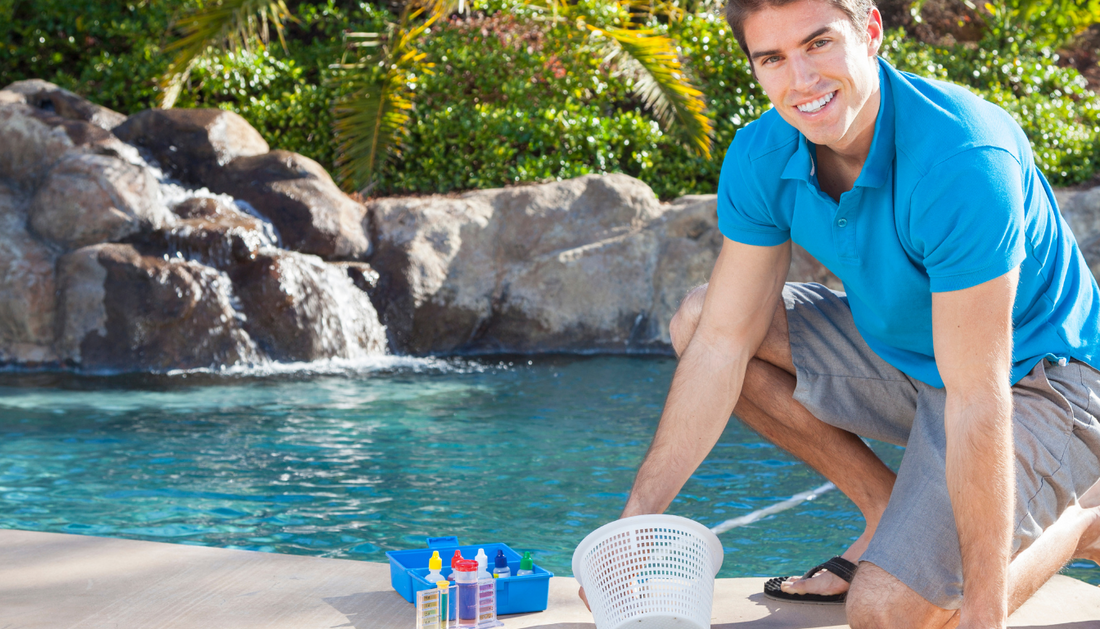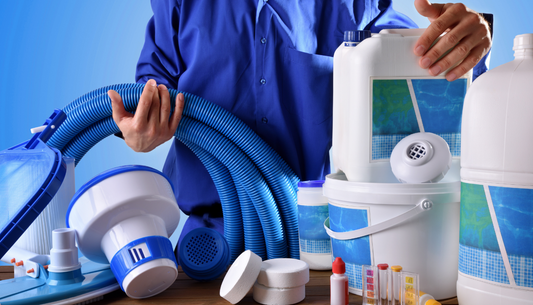
What is The Best Way to Clean A Swimming Pool?
Keeping your swimming pool clean is key to enjoying it for years. Knowing the best ways to clean your pool is important. It helps keep your pool in great shape all year.
Starting with regular cleaning from the beginning saves money and avoids big repairs. It's all about consistent care.

To clean your pool well, start with skimming, vacuuming, and balancing the water chemistry. Testing the water and using the right chemicals keeps it safe and healthy. Also, make sure to service your pool equipment regularly.
By following these steps, you can have a clean and sparkling pool with little effort.
Importance of Regular Pool Cleaning
Keeping your swimming pool clean is not just about looks. It's vital for everyone's health and safety. Regular cleaning stops harmful bacteria and algae from growing. This keeps the water clean and safe for swimming.
Why Clean Your Pool Regularly?
Regular cleaning stops debris, grime, and algae from building up. This makes the water safe for swimming. It also keeps the water clear and the pool's chemistry balanced. This is key for the pool's health and the cleaning equipment's efficiency.
Health Benefits
Clean pools are healthier for everyone. Removing contaminants lowers the risk of illnesses and skin problems. Regular maintenance keeps the water free from harmful bacteria and algae. This makes swimming safer and healthier for all.
https://www.youtube.com/watch?v=Ki04864R-OE
Aesthetic Benefits
Cleaning your pool makes your outdoor space more appealing. A well-kept pool is inviting and increases your property's value. Clean water and surfaces make your pool area beautiful and fun for relaxation and play.
Essential Pool Cleaning Tools
To keep your pool clean and inviting, you need the right tools. Skimmers, vacuums, and automatic cleaners are key. They help keep your pool water clear and safe.
Pool Skimmer
A pool skimmer is a must-have for pool cleaning. It picks up floating debris like leaves and insects. Using it often keeps debris from sinking and makes cleaning easier.
Pool Vacuum
A pool vacuum is vital for cleaning the pool floor. It removes dirt and debris, keeping the pool water clear. Regular use prevents algae and keeps the water sparkling.
Automatic Pool Robot Cleaner: BLUE OASIS Recommendation
The automatic pool robot cleaner makes cleaning easy. The BLUE OASIS is a top choice for its excellent performance. It cleans your pool on its own, saving you time and effort.

Using these tools regularly keeps your pool clean and ready for fun. Investing in quality like the BLUE OASIS automatic pool robot cleaner makes maintenance easier.
Steps for Manual Swimming Pool Cleaning
To keep your pool clean and inviting, follow a few key steps. These steps will make your pool safer and more beautiful. Here's how to keep your pool in top shape manually.
Skimming the Surface
Start by skimming the pool to get rid of floating debris like leaves and dirt. Use a long-handled leaf skimmer or net to pick up these items. This keeps the pool looking good and stops filters and pumps from getting clogged.
Brushing the Walls and Floor
Then, brush the pool walls and floor. This is important to remove algae and other buildup. Choose the right brush for your pool's material. For example, nylon works best on fiberglass and vinyl, while stainless steel is good for concrete. Pay extra attention to corners and steps where dirt tends to collect.
Vacuuming the Pool
Lastly, vacuum the pool to get rid of dirt from the bottom. Connect a manual pool vacuum to your pool's filtration system. This will pick up dirt that you missed during skimming and brushing. Vacuuming regularly keeps the water clear and helps your pool's system work better.
Using Pool Cleaning Devices for Efficiency
To clean your pool efficiently, using modern tools is key. Automatic pool cleaners and robotic vacuums can change how you care for your pool. These devices clean large areas on their own, leaving your pool spotless with little help from you.
Automatic pool cleaners come with features like programming. This means they can clean your pool when you're not around. They work best during times when energy is cheaper, keeping your pool ready for swimming.

Here's a detailed comparison of popular pool cleaning devices to help you make an informed choice:
| Device | Features | Efficiency |
|---|---|---|
| Robotic Pool Cleaners | Programmable, WiFi-enabled, Energy-efficient | High |
| Automatic Pool Suction Cleaners | Easy to install, No separate booster pump needed | Moderate |
| Pressure Pool Cleaners | Powerful jet cleaning, Ideal for large debris | Moderate-High |
Using swimming pool cleaning devices makes cleaning easier and keeps your pool clean. These tools help you enjoy a cleaner pool with less work. They ensure your pool is always ready for a swim.
Understanding Pool Chemistry
Keeping your pool water balanced is key for safe and enjoyable swimming. It involves balancing pH levels, using the right pool sanitizers, and regular water testing. Each step is important for clear water and longer pool life.
Balancing pH Levels
It's important to keep your pool's pH between 7.2 and 7.6. This range prevents damage and keeps swimmers comfortable. Regular water testing helps maintain the right pH levels.
Using Chlorine and Other Sanitizers
Pool sanitizers like chlorine kill harmful germs and algae. You can use tablets, liquid, or granules. Bromine or saltwater systems are also options. The goal is to keep sanitizer levels up through water testing.
Regular Water Testing
Testing your pool water often is critical. You can use home test kits or digital testers. Or, take samples to a store for a detailed check. This helps adjust pH, sanitizer, and other chemicals quickly.
Routine Maintenance Schedule
Creating a routine maintenance schedule is key for long-term pool care. Regular checks and upkeep keep your pool clean, safe, and ready all year. A good schedule includes daily, weekly, monthly, and seasonal tasks to keep your pool in top shape.
Weekly Tasks
Weekly tasks are the core of pool maintenance. They include:
- Checking and adjusting chemical levels
- Skimming the surface to remove debris
- Brushing walls and floors to prevent algae buildup
- Emptying skimmer and pump baskets
Monthly Tasks
Monthly tasks are more detailed and focus on the equipment. They include:
- Inspecting and cleaning the pool filter
- Checking the functionality of pool equipment like pumps and heaters
- Examining the pool liner and coping for signs of wear and tear
Seasonal Tasks
Seasonal care is vital for adapting to weather and usage changes. Key activities include:
- Preparing the pool for winter by lowering the water level and adding antifreeze to plumbing lines
- Reopening the pool in spring with a thorough clean and chemical balance
- Summer maintenance focusing on frequent cleaning and chemical adjustments due to increased use
- Fall tasks like removing leaves and performing pre-winter checks on equipment
By sticking to this maintenance schedule, your pool will stay in great shape all year. This plan covers everything from weekly tasks to seasonal care, ensuring your pool is always ready.
Professional vs. DIY: Choosing the Right Pool Maintenance Services
Choosing between professional pool maintenance and DIY can greatly affect your pool's health. If you want ease and skill, going pro might be best. They handle cleaning, chemical balancing, and equipment checks, keeping your pool perfect with little effort from you.
DIY pool cleaning, though cheaper, requires a lot of time and effort. You need to know about pool chemistry and how to use cleaning tools. Also, balancing pH levels and using sanitizers correctly is key for a clean pool.
The decision between professional help and DIY depends on your budget, time, and skills. Hiring pros can prevent mistakes and give you peace of mind. But, if you enjoy doing things yourself, taking care of your pool can be rewarding and cost-effective over time.
FAQ
What is the best way to clean a swimming pool?
To clean a swimming pool, use tools like skimmers, vacuums, and automatic pool robot cleaners like the BLUE OASIS. Start by skimming the surface, then brush the walls and floor. Vacuum the pool last. Keeping the pool chemistry right is also key for a clean and safe swim.
Why should you clean your pool regularly?
Cleaning your pool often keeps it in good shape and fun to use. It stops harmful bacteria and algae from growing. This keeps the water healthy and clear, making your pool look great.
What are the health benefits of regular pool cleaning?
Cleaning your pool often stops harmful bacteria and algae. This makes the water safe and clear for swimming. It also keeps the water healthy, reducing the chance of getting sick from it.
What are the aesthetic benefits of a clean pool?
A clean pool makes your space look better, adding value to your home. It keeps the water crystal clear and stops ugly debris and algae from building up.
What essential tools are needed for maintaining a swimming pool?
You'll need skimmers for floating debris, vacuums for settled particles, and automatic pool robot cleaners like the BLUE OASIS. These tools make cleaning more efficient and thorough.
What is a pool skimmer and how is it used?
A pool skimmer is a net on a long handle for removing leaves and insects from the surface. Regular use keeps the water clear and stops debris from sinking.
How does a pool vacuum work?
A pool vacuum sucks up dirt and particles from the floor. It captures them in a filter bag or directs them to the filtration system.
Why is the BLUE OASIS Automatic Pool Robot Cleaner recommended?
The BLUE OASIS is great for its efficient cleaning, programmability, and easy use. It removes debris well, making pool maintenance easier.
What are the steps for manual swimming pool cleaning?
Manual cleaning involves skimming, brushing, and vacuuming. Skimming removes surface debris, brushing gets rid of algae and deposits, and vacuuming takes out settled dirt.
How do pool cleaning devices enhance cleaning efficiency?
Devices like robotic cleaners and automatic vacuums clean a lot of the pool on their own. They're easy to program and work well, making maintenance easier.
How important is balancing pH levels in pool water?
Balancing pH levels is very important for water quality. It stops corrosion and scaling, keeping the water safe and comfortable for swimmers.
How do chlorine and other sanitizers contribute to pool health?
Chlorine and other sanitizers kill harmful bacteria and microorganisms. This keeps the water safe and clean for swimming. Regular sanitizing is key for water health.
Why is regular water testing important?
Testing the water regularly checks chemical levels. It helps keep pH levels right, ensures enough sanitizing, and keeps the water quality good. This makes swimming safe and enjoyable.
What are the routine maintenance tasks on a weekly basis?
Weekly tasks include checking and adjusting chemicals, skimming debris, and brushing the pool. These steps keep the pool clean and prevent harmful buildup.
What should be included in monthly pool maintenance?
Monthly maintenance should include checking and servicing pool equipment. This ensures it works well and prevents expensive repairs. It also makes your equipment last longer.
What are the seasonal tasks for pool maintenance?
Seasonal tasks include covering the pool in winter and getting it ready for summer. These steps keep the pool in top shape all year.
Should you choose professional pool maintenance services or a DIY approach?
Choosing between professional services and DIY depends on your time, skills, and budget. Professionals offer expert care and regular service. DIY can save money but needs a lot of time and knowledge of pool care.
